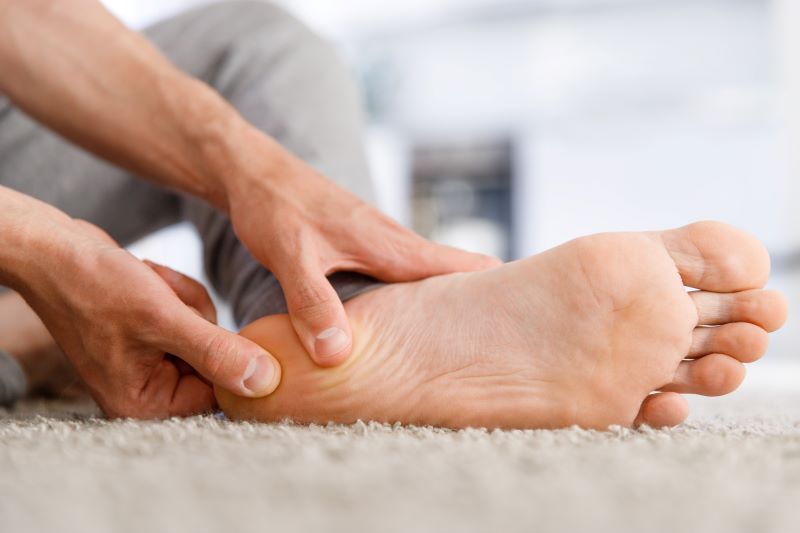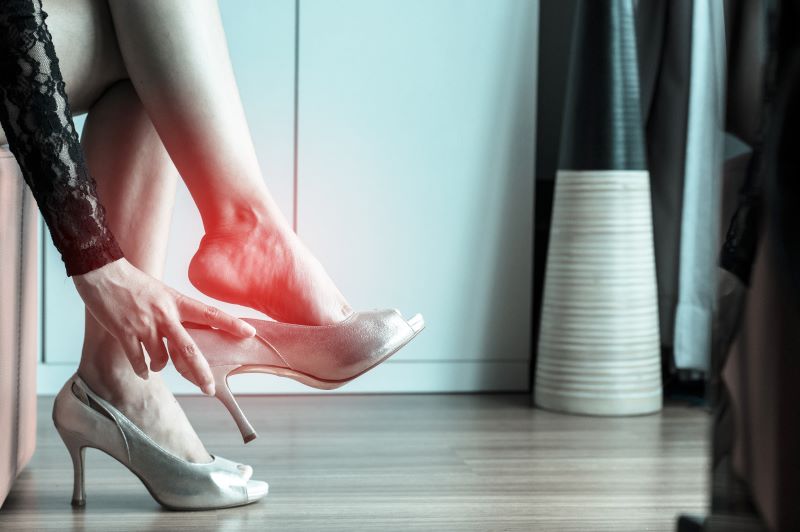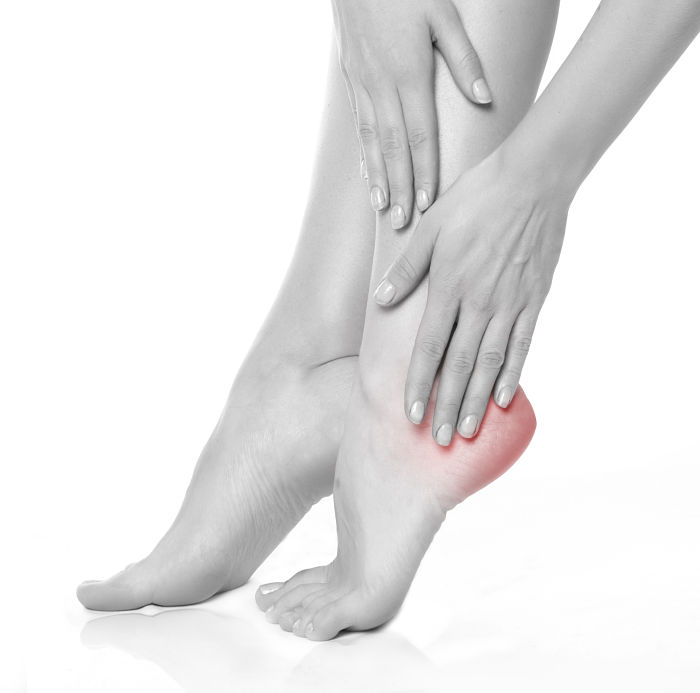Are you wondering why heel pain won’t disappear? Do you feel pain in your heel with every step you take? Heel pain affects about two million Americans annually, so you aren’t alone. It’s frustrating to have your daily activities hindered by heel pain, or worse, to lose any sports, exercise, or other hobbies you enjoy due to heel pain. Whether you are a runner who is experiencing heel pain all of a sudden, or the cause of your heel pain is a mystery, you don’t have to live with heel pain. Foot & Ankle Specialists of Illinois can help you get to the bottom of why you are experiencing heel pain so you can find an effective treatment plan.

Why Heel Pain Won’t Disappear
Your heel is the back part of your foot, below the ankle and behind the arch. A sore or painful heel is a common foot and ankle complaint. Anything that puts strain or pressure on your foot can cause heel pain. The way you walk and your foot’s shape can also contribute to heel pain that won’t disappear.
Sometimes, the reason why heel pain won’t disappear is that you don’t know what’s behind it. Knowing why you are experiencing the pain is the key to treating the problem and easing discomfort.
There are several causes and risk factors for heel pain. You might be more likely to develop heel pain that won’t go away if you:
- Have foot and ankle arthritis
- Have high foot arches
- Run or jump in sports or during your workouts
- Are overweight
- Spend a lot of time standing
- Wear improperly fitting shoes without arch support or a cushion
Heel pain can interfere with your ability to go about your daily life, like getting around, working, exercising, and completing tasks. Many heel pain issues can be treated without surgery and will improve with time.
 What is Causing the Pain in the Heel of My Foot?
What is Causing the Pain in the Heel of My Foot?
The most common causes of heel pain are plantar fasciitis and Achilles tendinitis, but various conditions can cause pain in the heel of your foot, including:
Plantar Fasciitis
Plantar fasciitis is one of the most frequent causes of heel pain. This condition involves the inflammation of a thick band of tissue that runs around the bottom of each of your feet and connects the heel bone to the toes.
If you have plantar fasciitis, you might experience stabbing pain that typically occurs with your first steps in the morning. The pain might decrease as you get up and move, but return after long periods of standing, or when you stand up after sitting. The cause of plantar fasciitis is unknown, but it is common in runners and in people who are overweight.
If you ignore plantar fasciitis, it can result in chronic heel pain that will curb your ability to perform your regular activities. We have various treatment options for plantar fasciitis, including medications, lifestyle and home remedies, surgical treatments, and injections.
Achilles Tendinitis
The other most frequent cause of heel pain is Achilles tendinitis, which is an overuse injury of the Achilles tendon. Your Achilles tendon is the band of tissue that connects the calf muscles at the back of your lower leg to your heel bone.
Achilles tendinitis is most common in runners who have suddenly increased the intensity or length of their runs. It is also common in middle-aged people who play sports, like tennis or basketball, on the weekends.
If you are experiencing pain near your Achilles tendon, it is important to seek medical attention right away. If your Achilles tendon is ruptured or torn, it is a serious injury.
Bursitis
Bursitis is an extremely painful condition that happens when the small, fluid-filled sacs called bursae that cushion the bones, tendons, and muscles near your joints become inflamed. Though bursitis commonly happens in the shoulder, elbow, and hip, it can also happen in your heel.
If you have bursitis, your heel might feel achy or stiff, hurt more when you move it or press on it, or even look swollen and red.
If you have bursitis in your heel, it’s important to rest it and protect it from additional trauma or injury. In most cases, bursitis will go away within a few weeks with proper treatment, but repeated flare-ups are common, especially without medical care.
Other Possible Causes of Heel Pain
Several possible conditions might be causing your heel pain, including a bone tumor, Haglund’s deformity, a heel spur, osteomyelitis, Paget’s disease of bone, peripheral neuropathy, plantar fasciitis, reactive arthritis, rheumatoid arthritis, sarcoidosis, stress fractures, or tarsal tunnel syndrome. It is difficult to diagnose the reason behind constant heel pain that won’t go away without visiting a doctor.
 What If I Have a Bruised Heel Bone?
What If I Have a Bruised Heel Bone?
Do you feel like you are walking on a pebble? You might be suffering from a bruised heel. A bruised heel (sometimes referred to as “policeman’s heel”) is an injury to the fat pad that protects your heel bone itself. You can suffer a bruised heel bone if you run or jump repetitively, or it can occur from a single injury, like jumping from a high height and landing on your heel.
Your bruised heel bone can take days or even weeks to recover. Some treatment options might include new supportive shoes, stretching, massages, orthotics, or rarely, surgery.
Treatment Options for Constant Heel Pain
Luckily, many heel conditions can be treated with nonsurgical options. At Foot & Ankle Specialists of Illinois, our treatment options vary depending on your individual diagnosis and needs. We will work with you to develop a personal treatment plan and help you get back to your everyday activities as soon as possible!
Seek Help for Your Heel Pain at Foot & Ankle Specialists of Illinois
Don’t wonder why your heel paint won’t go away any longer. At Foot & Ankle Specialists of Illinois, we help you manage a number of conditions that can cause heel pain. There are several different treatment options available to heal your heel pain for our patients in the Algonquin, Huntley, and Cary areas. Contact us today to learn more about our heel treatment programs!

